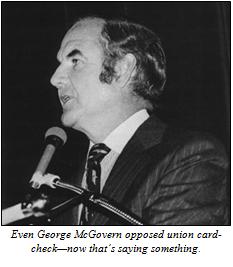By Isaac MacMillen

At stake is Big Labor’s nefarious “card check” scheme—which would deprive workers of the time-honored secret ballot when a vote on organizing unions occurs. The unions, of course, claim that only “extreme” conservatives oppose the EFCA. However, Big Labor’s “card-check” scheme has been met with opposition from across the political spectrum, including 1972 Democratic Presidential Nominee—and die-hard liberal—George McGovern.
So, why is the EFCA so controversial? Is it, as the unions insist, simply supposed to help employees more easily form unions to bargain for better or more equitable wages? And would it really, as the union chieftains maintain, stop horrifying abuses by corporate CEOs?
While the unions may want the American people to believe those claims, the notion that the EFCA would help the average worker flies in the face of human experience—and one hastens to add, the Declaration of Independence. Instead of protecting workers, it protects the unions, by allowing them to intimidate workers into agreeing to unionization—under the leering, lustful of bare-knuckle union organizers. Here’s how card check would work:
You sit at your workbench or desk, a union goon walks up, hands you a card that says “I want a union” and tells you to sign it, or else. He then looms over you (very likely cracking his knuckles or fondling his sap) while you long for the bygone days of the secret ballot. And, iof you take too long in assigning your John Hancock, he may even make you an offer you can’t refuse, as in “Your brains or your signature are going to be on that card.”
Of course, unions have good reason to be afraid. For decades now, they have been on the decline. The Bureau of Labor Statistics stated in 2007 that union membership had dropped approximately 40 percent in the past 23 years—12.1 percent of workers were unionized, compared to 20.1 percent in 1983, when the BLS first began tracking union membership.
Predictably, the New York Times is praising EFCA, encouraging President-Elect Obama’s new Secretary of Labor to push it. The Times gushes:
“The measure is vital legislation and should not be postponed. Even modest increases in the share of the unionized labor force push wages upward, because nonunion workplaces must keep up with unionized ones that collectively bargain for increases. By giving employees a bigger say in compensation issues, unions also help to establish corporate norms, the absence of which has contributed to unjustifiable disparities between executive pay and rank-and-file pay.”
Did you catch that? The Times is expressing hope that passage of the EFCA would raise wages. This from a company that has already lowered wages and fired workers to stave off bankruptcy. During an economic slump, when industries are lining up by the dozens to procure bailouts or face disaster, it hardly seems like a wise policy to pursue wage hikes. A wiser policy may be to protect jobs—and manage to survive. But, alas, all that is lost on the Old Grey Lady.
Recently, the Service Employees International Union (SEIU) quoted the above paragraph in an email urging support for EFCA. Significantly, they neglected to include the patently absurd “wage increase” claim. Apparently even the SEIU understands the principle that higher wages cannot be absorbed by struggling companies during an economic recession. And yet, in seeking to suppress that fact, they are implicitly arguing against the very incentive unions use to lure members—higher benefits—in order to increase their power.
A quick look at the case of the United Auto Workers union is all that is necessary to see the damage that has been done to American industry through greedy union hegemony. As they threatened Congress with the collapse of an industry, they refused to part with their own money-losing, multi-million dollar golf course. To them, the rules are quite simple: Secure the support of the workers by promising benefits the company can’t afford—and once the company threatens bankruptcy, appeal to the government for more money. But whatever happens, no matter the cost, do not relinquish any of the power accumulated by bludgeoning management and destroying jobs.
Those are the rules by which the SEIU, as well as the UAW and others, play. And now they want push-button unionism card-check skullduggery to help them dragoon more workers into their shrinking ranks. Having failed to earn allegiance, they now turn to coercion—and demand the government’s compliance.
More than three decades ago, the highly esteemed columnist for the Washington Post, William Raspberry wrote of compulsory unionism: “Good unions don’t need it, and bad unions don’t deserve it.” Mr. Reid and Madame Pelosi, please take note.
Isaac MacMillen is a contributing editor of ALG News Bureau.

